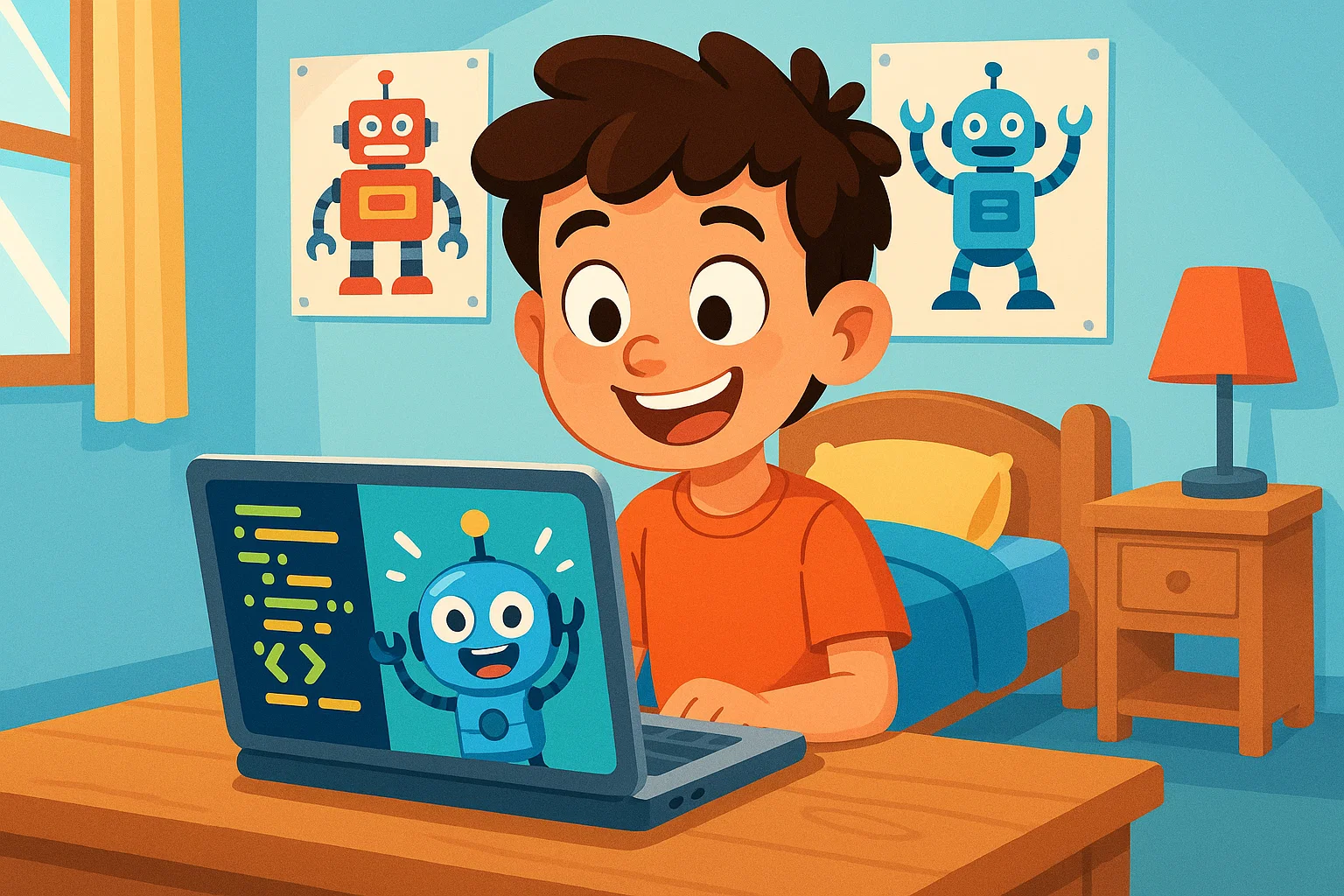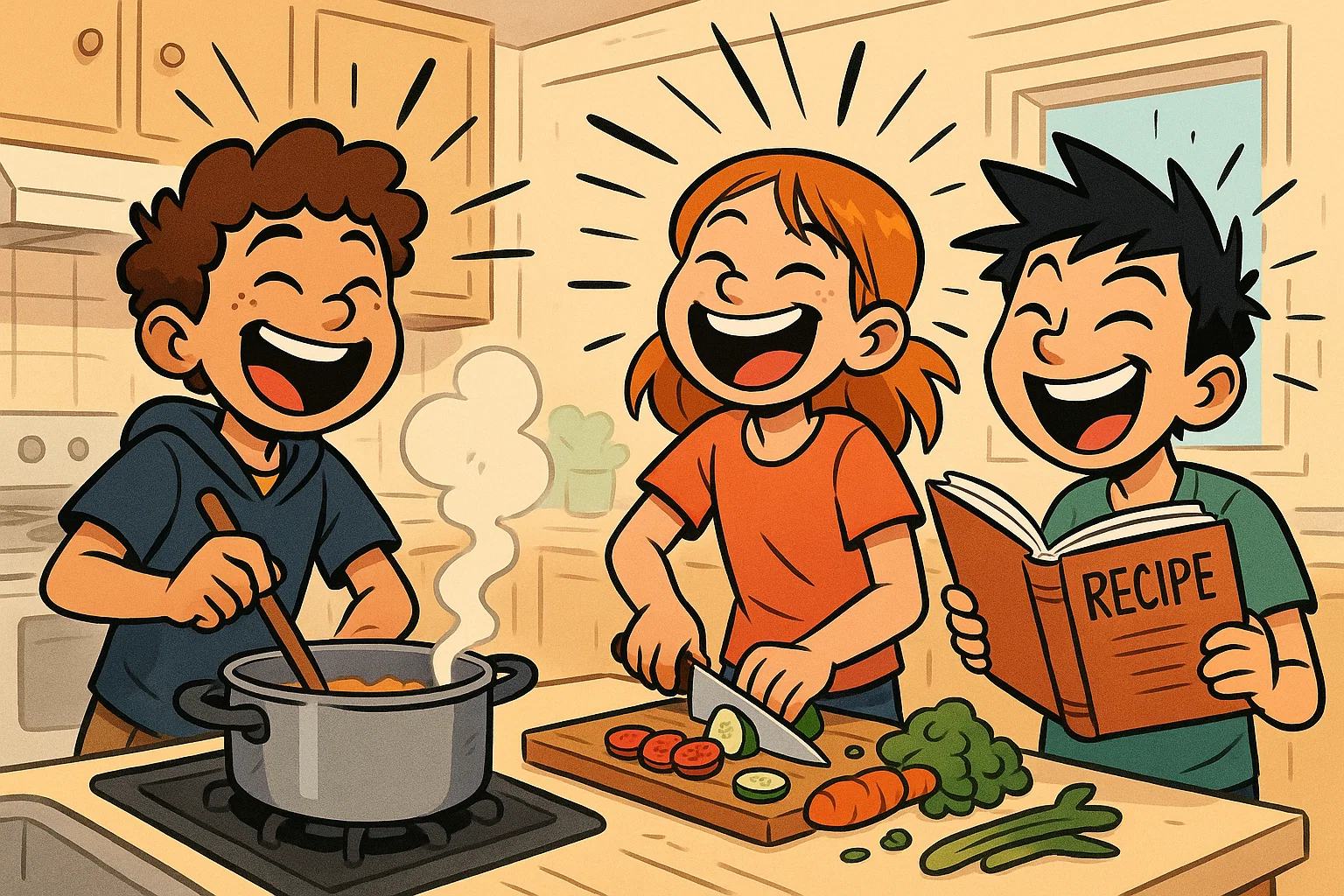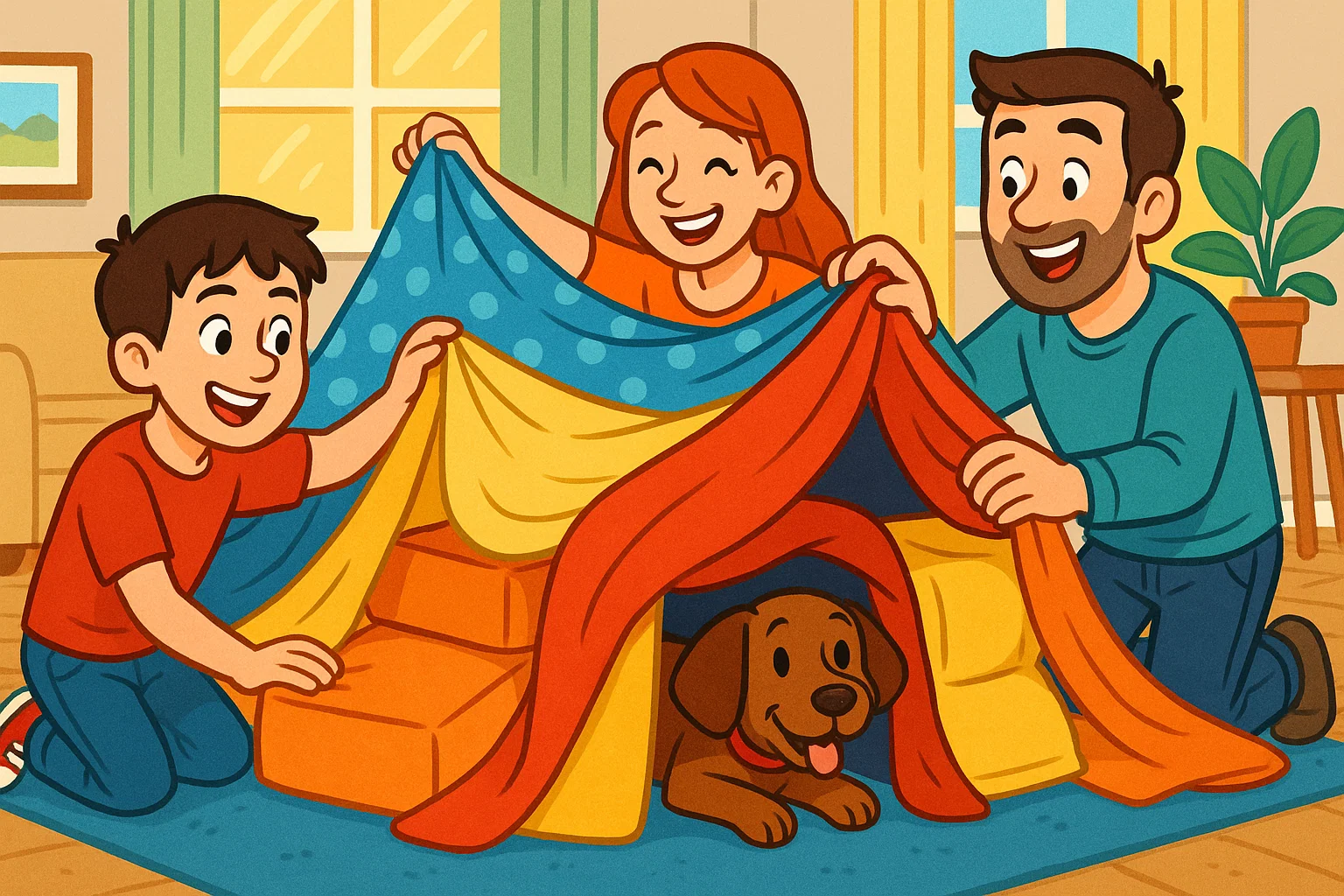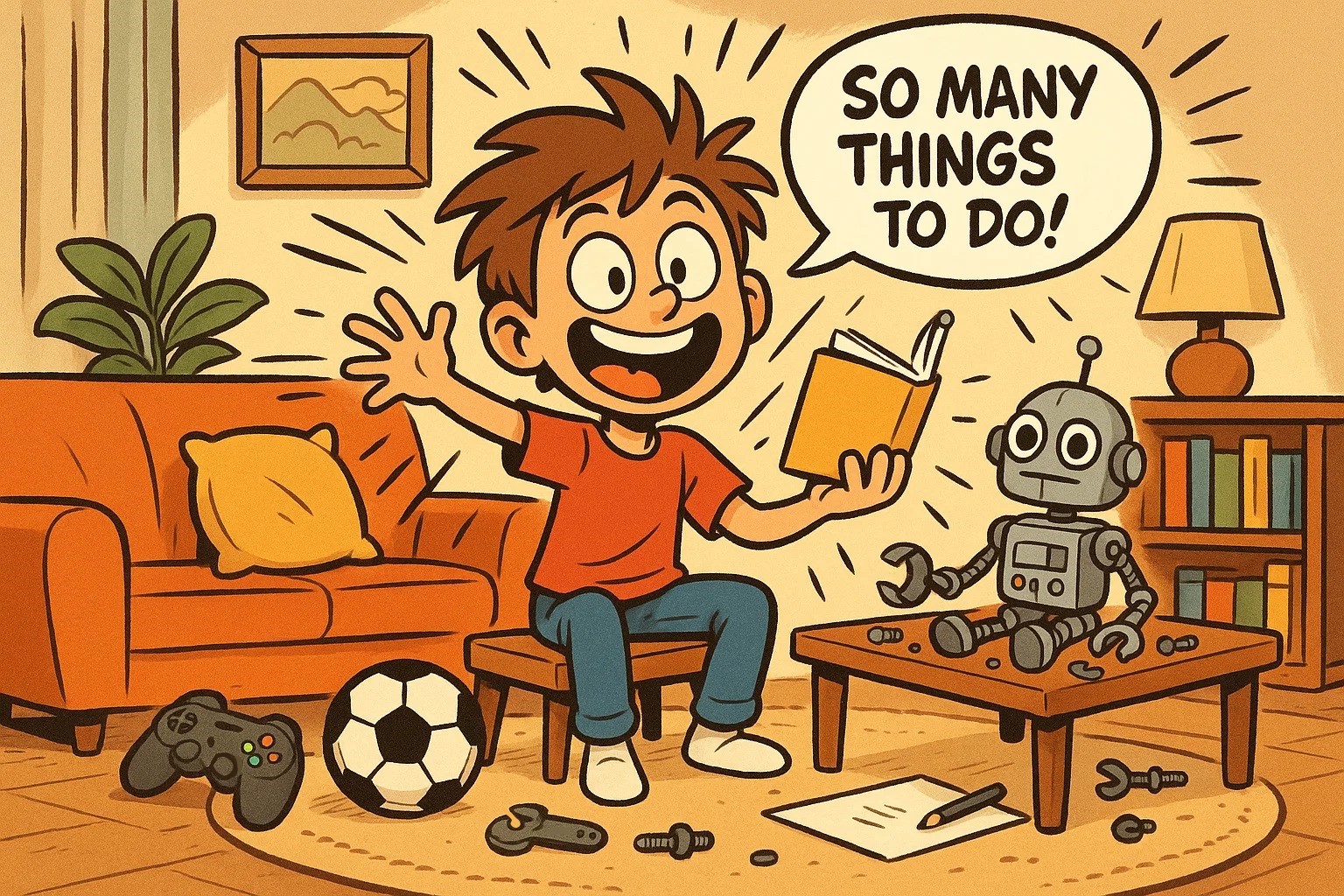Finding engaging activities for your 12-year-old at home can feel like a constant challenge. At this pivotal age, kids are developing their independence while still craving fun and meaningful ways to spend their time.
Whether you’re dealing with a rainy day, school break, or simply want to create memorable experiences, the right activity can transform boredom into excitement. This comprehensive guide offers practical, age-appropriate options that will keep your tween engaged, learning, and having fun while providing your kid with valuable developmental opportunities.
Individual Activities for 12 Year Olds

Twelve-year-olds are at a unique stage where they’re developing their own interests and gaining the focus needed for more complex projects. These solo activities help build independence while nurturing creativity and critical thinking skills that every kid at this age needs.
Learn Coding 💻
Coding isn’t just about computer science—it’s about logical thinking and problem-solving. Your kid can start with visual programming languages like Scratch or explore beginner-friendly platforms such as Code.org. These resources make coding accessible and fun, allowing young learners to create their own games and animations.
Many 12-year-olds find mobile app development particularly engaging. Platforms like MIT’s App Inventor let kids design functional apps without complex syntax. According to a 2023 study by the National Science Foundation, children who learn coding show improved mathematical reasoning and enhanced creativity.
Read Books and Podcasts
Reading remains one of the most valuable activities for developing language skills and expanding knowledge. Encourage your kid to pick books from different genres—mystery, science fiction, biographies, or graphic novels. Consider starting a personal reading challenge or book journal to track progress and thoughts.
Podcasts offer another excellent opportunity for learning. Shows like “Brains On!” or “Wow in the World” combine entertainment with science education. Audio content helps develop listening skills and exposes kids to new vocabulary in an engaging format.
Design and Create 🎨
Creative projects allow 12-year-olds to express themselves while developing fine motor skills and spatial reasoning. Set up a dedicated craft space with materials like colored paper, markers, fabric scraps, and basic tools. Your kid might design greeting cards, create jewelry, or even build miniature dioramas.
Digital design tools like Canva for Education or Tinkercad introduce children to professional-level creative software. These platforms help young designers create everything from posters to 3D models, bridging the gap between traditional crafts and modern design skills.
Do Puzzles and Brain Games
Brain games challenge cognitive abilities while providing hours of entertainment. Jigsaw puzzles with 500-1000 pieces are perfect for this age group, helping develop patience and visual-spatial skills. Logic puzzles, Sudoku, and crosswords strengthen different types of thinking.
Board games like Rush Hour or Gravity Maze combine fun with learning. Research published in the Journal Children indicates that kids who regularly engage in puzzle-solving activities show improved academic performance and better concentration skills.
Build with LEGO 🔧
LEGO building goes far beyond following instruction manuals. Encourage your 12-year-old to create original designs, modify existing sets, or build functional machines using LEGO Technic pieces. This activity develops engineering thinking and mathematical concepts like geometry and proportion.
Consider introducing LEGO robotics kits like MINDSTORMS or SPIKE Prime. These advanced sets combine building with programming, creating an excellent STEM learning opportunity that keeps any kid engaged for hours.
Watch and Review Movies
Transform passive screen time into an active learning experience by having your child write movie reviews. This activity develops critical thinking, writing skills, and media literacy. Create a simple rating system and encourage discussions about plot, character development, and cinematography.
Documentary films can be particularly educational. Nature documentaries, historical films, or science-focused content provide learning opportunities while maintaining entertainment value. The key is choosing age-appropriate content that sparks curiosity and discussion.
Group Activities for 12 Year Olds

Social activities help tweens develop communication skills, learn teamwork, and build lasting friendships. These collaborative projects work well with siblings, friends, or small groups where every kid can contribute meaningfully.
Plan and Cook a Meal 🍳
Cooking teaches practical life skills while offering opportunities to learn about nutrition, measurements, and following instructions. Start with simple recipes that your kid can largely manage independently, like pasta dishes, homemade pizza, or basic baked goods.
Meal planning adds another layer of learning, involving budgeting, shopping lists, and time management.
Create a Movie
Modern smartphones make filmmaking accessible to young people. Your 12-year-old and friends can write scripts, assign roles, and produce short films using simple editing apps. This project combines storytelling, technology, and collaboration in ways that engage any creative kid.
Start with basic concepts like planning scenes, understanding camera angles, and creating simple special effects. The process teaches project management skills and encourages creative problem-solving. Many young filmmakers discover passions for writing, directing, or technical aspects of video production.
Hold a Game Tournament
Organize tournaments around various games—video games, board games, or outdoor activities. Create brackets, establish rules, and even design prizes or certificates. This activity teaches organization skills, fair play, and healthy competition that helps every participating kid develop social awareness.
Consider rotating between different types of games to accommodate various interests and skills. Physical games might include ping pong with glow lights for added excitement, while strategy board games challenge different thinking skills.
Do a Scavenger Hunt 🔍
Design treasure hunts that take advantage of your home and yard space. Create clues that require problem-solving, physical activity, and observation skills. Use technology by incorporating Google Maps for neighborhood hunts or QR codes for digital clues.
Themed hunts work particularly well—mystery-solving adventures, nature discoveries, or historical explorations. The planning process itself becomes an activity as children brainstorm clues and hide items for others to find.
Activities for 12 Year Olds with Family

Family activities strengthen relationships while creating shared memories. These options work well for different family sizes and can be adapted based on available time and resources, ensuring every kid feels included and valued.
Family Sports and Games ⚽
Physical activity benefits both individual health and family bonding. Set up mini-tournaments with sports like basketball, soccer, or tennis. For indoor options, consider active video games that get everyone moving while keeping your kid physically engaged.
Create family challenges like obstacle courses in your backyard or living room. These activities promote physical fitness while encouraging teamwork and friendly competition. Research posted on DovePress shows that families who exercise together have stronger emotional connections and better communication.
Organize a Charity Event
Teaching empathy and social responsibility, charity work helps 12-year-olds understand their role in the community. Plan family volunteer activities like collecting items for local shelters, organizing neighborhood cleanup days, or creating care packages for elderly neighbors.
Small-scale fundraising events can be managed from home—bake sales, craft sales, or sponsored activities. This involvement helps your kid develop organizational skills while learning about civic responsibility and helping others in meaningful ways.
Build a Fort 🏰
Fort building never gets old, but 12-year-olds can create more elaborate structures than younger children. Use furniture, blankets, and creative engineering to build impressive indoor fortresses. This activity encourages spatial reasoning, teamwork, and creative problem-solving.
Consider themed forts—space stations, medieval castles, or modern hideouts. The construction process itself becomes a bonding experience as family members contribute different skills and ideas to the project.
Benefits of Engaging 12 Year Olds in Activities
Understanding why activities matter helps parents choose the most beneficial options for their children. The tween years represent a crucial developmental period where structured activities can significantly impact future success for any kid.
Develop New Skills
Diverse activities expose children to various skill sets they might not encounter in school. Coding develops logical thinking, cooking teaches practical life skills, and creative projects enhance artistic abilities. According to child development experts, this age represents an optimal time for skill acquisition due to brain plasticity and increased attention span.
Cross-training between different types of activities creates neural pathways that support academic learning. For example, musical activities may improve mathematical understanding, while physical challenges can enhance cognitive flexibility in any developing kid.
Reduce Screen Time 📱
While technology plays an important role in modern life, balanced screen time remains crucial for healthy development. Engaging activities provide alternatives that are equally appealing but offer different types of stimulation and learning opportunities for your kid.
The American Academy of Pediatrics recommends that children engage in at least one hour of physical activity daily, along with creative and social activities. Well-planned home activities help achieve this balance naturally without feeling restrictive.
Strengthen Family Bonds
Shared activities create opportunities for meaningful conversations and relationship building. During collaborative projects, family members learn about each other’s strengths, interests, and perspectives. These interactions build trust and communication skills that benefit relationships long-term.
Research published in the European Journal of Sociology indicates that families who regularly engage in structured activities together report higher satisfaction levels and better conflict resolution skills.
Safety Tips to Follow
Creating safe environments for activities ensures that fun experiences don’t result in accidents or inappropriate exposure. These guidelines help parents maintain appropriate supervision while encouraging independence for every kid.
Monitor Online Activity 🛡️
When activities involve internet access—whether for coding tutorials, research, or communication—establish clear guidelines and supervision appropriate for your child’s maturity level. Use parental controls and maintain open conversations about online safety with your kid.
Check the platforms and websites your child uses for activities. Ensure they’re age-appropriate and have proper safety measures in place. Many educational platforms designed for children include built-in safety features, but parental awareness remains essential.
Check for Household Hazards
Before starting any activity, assess potential safety risks in your environment. Craft activities might involve scissors or small parts, cooking requires kitchen safety awareness, and building projects may need tools or materials that require supervision.
Create activity-specific safety rules and ensure your kid understands them before beginning any project. Having a well-stocked first aid kit accessible and knowing basic safety procedures helps handle minor incidents calmly and effectively.


